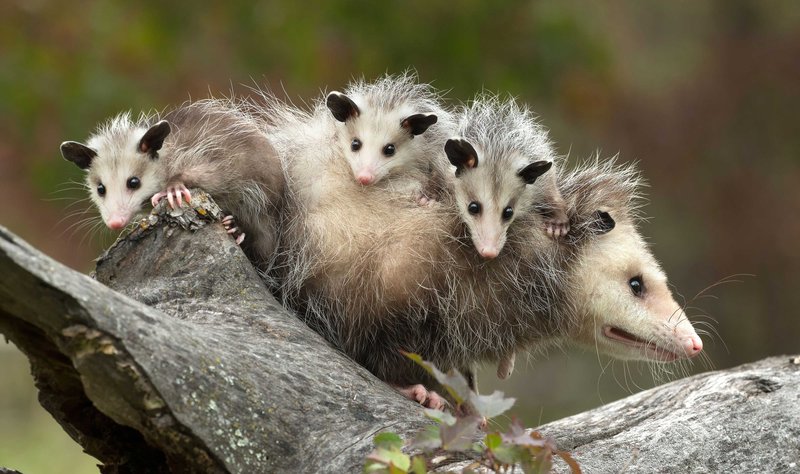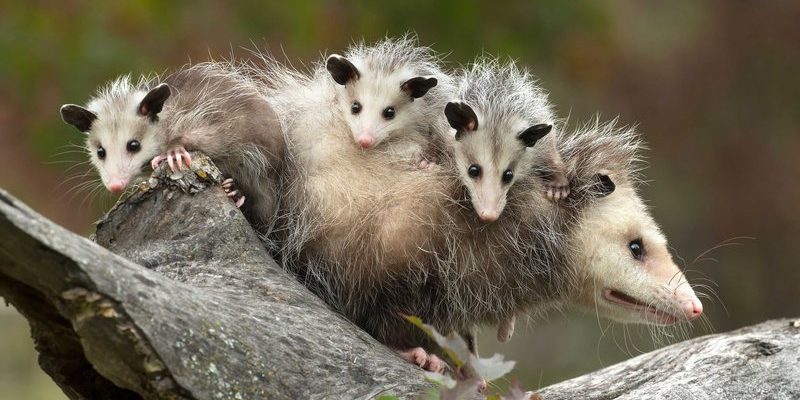
Opossums have a unique approach to parenting that’s both tender and practical. They’re not just tossing their young out into the world; they invest time and care in raising their babies. Think of it as a combination of teamwork and self-defense. You may wonder, what does that look like in reality? Well, it involves everything from carrying the youngsters around to teaching them how to navigate the world. Let’s break this down and explore the life of baby opossums step by step.
Understanding Opossum Reproduction
To appreciate how opossums raise their young, we need to understand a bit about their reproduction. Opossums are unique among mammals because they have a relatively short gestation period. Female opossums usually carry their babies for only about 12 to 13 days. Can you believe that? After such a brief time, they give birth to anywhere from 6 to 20 tiny, hairless, and underdeveloped babies.
Here’s the kicker: these babies are so small they can fit in a teaspoon! As they’re born, the little ones instinctively crawl to their mother’s pouch. This pouch is a safe haven, where they latch onto a teat to drink and develop further. It’s like a cozy nursery where they get all the nutrients they need. It’s pretty amazing how nature works in favor of these tiny creatures from the very start.
The Role of the Opossum’s Pouch
Speaking of the pouch, it plays a crucial role in the survival of opossum babies. The pouch is not just a cute feature; it’s a lifeline. As the babies grow, they stay in the pouch for about two to three months. During this time, they are protected from predators and environmental dangers while they develop.
Think of the pouch as a little incubator where the babies get super snug and comfy. This is where they’ll slowly start sprouting fur and opening their eyes. A mother opossum can be found doing her daily foraging while carrying her babies along for the ride. Picture her exploring the night, with her little passengers peeking out to take in the world around them.
Foraging and Learning
As the babies grow older, they start to venture out of the pouch. This is when the real adventure begins! Typically around 2–3 months old, young opossums start to ride on their mother’s back. It’s like they have front-row seats to the world. During these outings, the mother teaches them vital skills, like what to eat and how to avoid dangers.
Honestly, it’s like a crash course in survival. From insects to fruits, she shows them what’s safe to munch on and what to stay away from. You can imagine the little ones taking notes in their tiny opossum brains, getting ready to fend for themselves eventually. Mother opossums are great teachers, and their patience is impressive as they guide their young through different landscapes.
Independence and Weaning
Around the age of 2–3 months, opossum babies begin the weaning process. This transition is crucial for them to learn self-sufficiency. The mother will gradually reduce nursing, encouraging her little ones to eat solid foods. It’s a bit like sending them off to college—sure, they’re still your babies, but they need to learn how to take care of themselves.
During this time, the young opossums also start to explore their surroundings more independently. They’ll practice climbing trees and foraging on their own. Although they have a roof over their heads (or, in this case, a pouch), they need to start figuring things out. It’s a mix of freedom and responsibility, essential for their growth into adult opossums.
Final Stages of Maturity
As the young opossums continue to grow, they’ll eventually reach an age where they’re ready to leave their mother. Typically, by the time they are around four months old, they are mostly independent. At this stage, they have a good grasp of what to do out in the wild and can fend for themselves.
Picture a young opossum reflecting on his upbringing; he’s had a front-row seat to life’s lessons from mom. Knowing how to escape predators, find food, and navigate their environment, these young opossums are set up for success. That early investment of a mother opossum’s time and energy has paid off, and her babies are ready to start their own adventures in the wild.
Challenges and Survival
While opossums are resilient creatures, they face various challenges in the wild. Their small size makes them potential prey for larger animals. Therefore, teaching their young how to stay safe is one of the mother’s primary jobs. Baby opossums learn to be cautious around dangers and develop strategies to evade predators.
Here’s the thing: opossums are also known for their unique defense mechanisms. When threatened, they can “play dead” or feign illness, which can baffle or deter predators. You can imagine how crucial this skill is for a little one learning the ropes. It’s practically a survival tactic handed down through generations, helping them navigate through a world filled with potential dangers.
In the grand scheme of nature, the way opossums raise their young is a beautiful example of nurturing in the wild. They invest time, energy, and knowledge into ensuring their babies grow up to be strong, independent individuals. From snugly pouches to lessons about the outside world, every step is essential for their development.
So, the next time you see an opossum creeping through your yard, remember the incredible journey it underwent to survive. Each little opossum represents the hard work of a dedicated mother who made it possible for her young to thrive. Nature has a way of reminding us just how interconnected life is, and the story of opossums is just one of many that shows the beauty of parenting in the wild.

